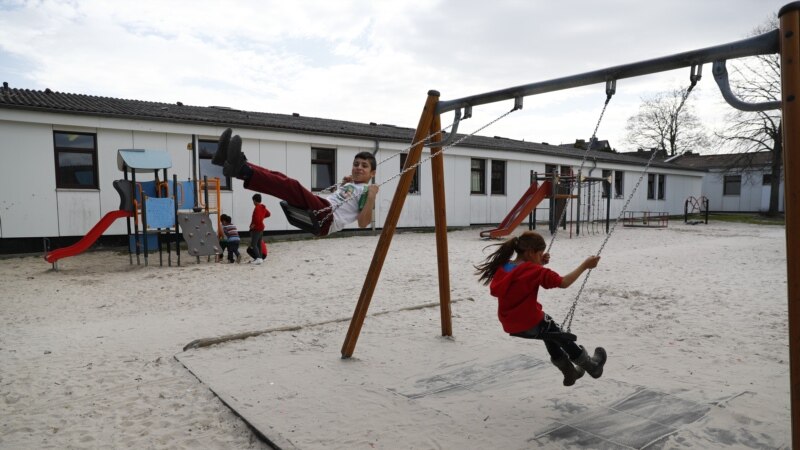New 'Roadmap' Provides Lifeline for Unaccompanied, Migrant Children in Europe

Thousands of unaccompanied and separated refugee and migrant children risk exploitation, trafficking, abuse and violence because European asylum countries have failed to protect them, according to three leading humanitarian organizations.
To remedy this situation, the United Nations' refugee agency (UNHCR), the U.N. Children’s Fund (UNICEF) and International Rescue Committee (IRC) have devised a “Roadmap for Action†to protect vulnerable children arriving and staying in Europe.
â€While the total number of arrivals to Europe has decreased, the situation of unaccompanied and separated children remains an emergency,†said Diane Goodman, deputy director of the UNHCR’s Europe bureau.
“It is wrong to assume that children are safe as soon as they reach Europe. They are not. In fact, many children experience violence, abuse and exploitation while in Europe and Europe is failing these extremely vulnerable children,†she said.
Goodman noted that the youngsters often were detained upon arrival in Europe, with many placed with adults in large centers. Others were living in squats, train stations or on the streets.
“Without safe and appropriate care, we will never be able to establish trust or find a solution in the child’s best interests,†she said.
UNICEF has said the underlying causes that prompted children and their families to make the perilous journey across the Mediterranean Sea remain, as millions of people are still affected by the conflicts in Syria, Iraq and Afghanistan.
Launched Monday, the Roadmap was developed in consultation with 100 practitioners, including guardians, psychologists, social workers and lawyers, as well as authorities from several European countries and the European Union.
Annalisa Brusati, the IRC’s child protection senior technical adviser, noted that refugee and migrant children who testified about their experiences, fears and hopes and dreams also provided valuable input to the development of the Roadmap.
For example, she said a 14-year-old Algerian boy told aid workers that “all children my age are not feeling safe. They are forced to go into war and they are all dying."
“We deserve a normal childhood like other children in the world,†he said.
Additionally, there was the 17-year old Afghan boy who described how unprotected he and other children felt during their perilous journey, concluding that, “We were forced to trust the smugglers.â€
Commenting on the testimonials, Brusati said, “The children’s experience also shows a way forward by letting us know what currently works and what needs to be scaled up and replicated.
"The way forward that IRC, UNHCR and UNICEF are presenting today completes this roadmap and lays out our seven clear recommendations to improve the current response offered to these children, ensuring they are protected and supported in a coordinated and effective manner,†she said.
The Roadmap highlights the need to identify children, register them through child-friendly procedures and “build a relationship of trust with them as early as possible.†Another key recommendation is to ensure that a well-trained guardian takes immediate responsibility for the child.
“This is a really important part because every child needs to feel safe as soon as possible,†David Mcloughlin, UNICEF’s deputy director for Europe and Central Asia, told VOA.
“They need someone who is responsible that can be trusted as a guardian,†he said.
Data show that since July 2015, more than 130,000 unaccompanied and separated children have arrived in Europe. The United Nations reports more than 5,000 children traveled to Greece, Italy, Bulgaria and Spain during the first quarter of this year and that nearly 70 percent of them were by themselves.
In March, UNICEF welcomed a decision by Italy's parliament to pass a law aimed at supporting and protecting the record number of foreign unaccompanied and separated children who arrived in that country. Nearly 26,000 did so in 2016, with the numbers expected to climb this year.
The aid agencies report that most unaccompanied children arriving in Europe were boys between the ages of 15 and 17. The majority who made it to Greece in the first three months of 2017 were from Afghanistan, Pakistan, Syria and Iraq.
They reported that 94 percent of the 3,714 children who arrived in Italy were unaccompanied or separated. Most originated from Guinea, Gambia, Ivory Coast and Bangladesh.
Lucio Melandri, UNICEF migration coordinator, observed that these youngsters encountered violence throughout their journey; but, those who were particularly vulnerable, he noted, were the children who were overlooked in the national systems.
â€Falling through the cracks means that they are becoming almost invisible. So, they are then relying on smuggling, criminal organizations.
“And, you know that frequently, this kind of path could lead to human trafficking, could lead to prostitution of children, could lead to even worse cases of abuse and exploitation,†he said. “We need institutions to prevent all of this happening, to prevent violence.â€

0 Response to "New 'Roadmap' Provides Lifeline for Unaccompanied, Migrant Children in Europe"
Posting Komentar